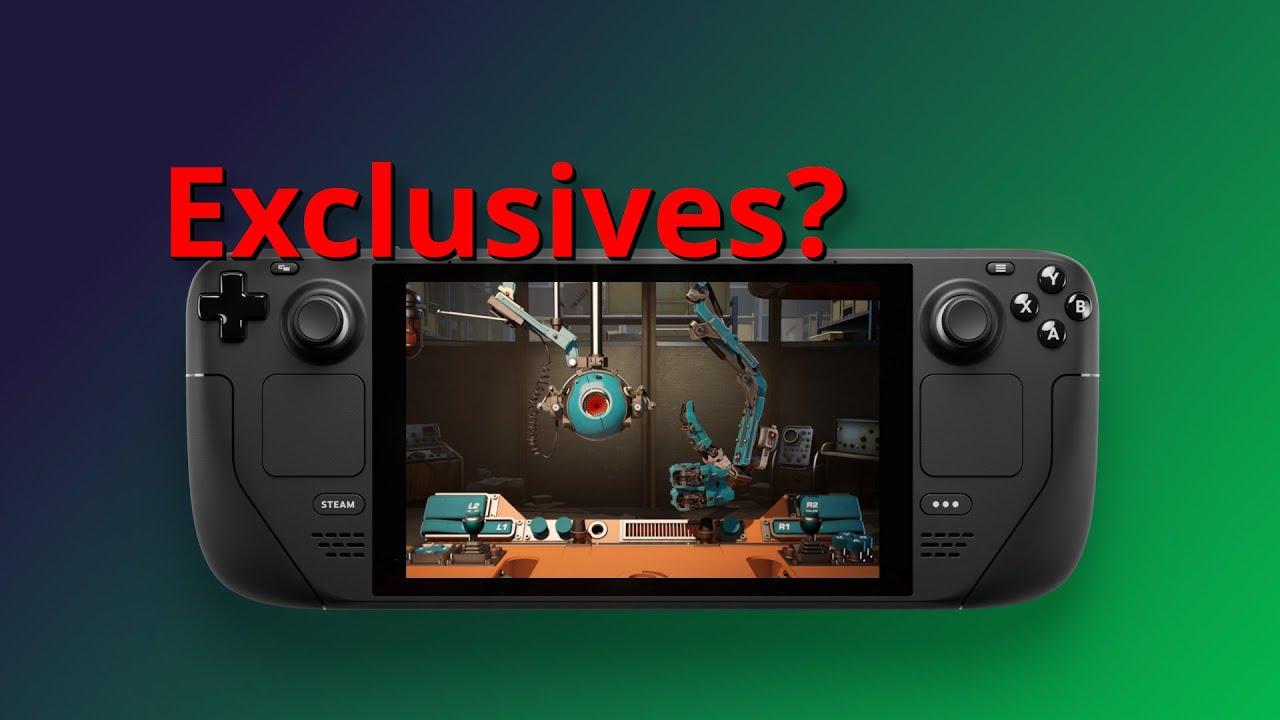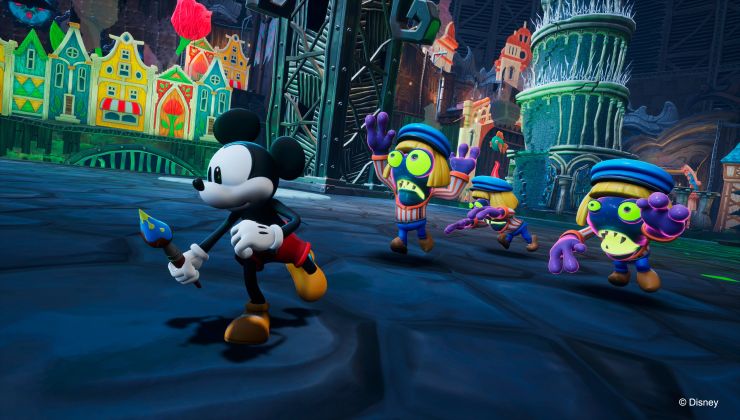Now and then the exclusive game discussion pops up, because someone thinks it would be a good idea to lock games to a platform. Here we go again.
This time the culprit is PCGamesN in an article titled "The Steam Deck is missing an important element – exclusives". Respectfully, I thoroughly disagree and think exclusive games are ludicrous and anti-consumer due to the very nature of them being exclusionary.
While their article touches on an important bit: games taking better advantage of the Steam Deck uniqueness directly, and personally I do think developers should spend a little more time ensuring gamepad support is top-quality at release, along with text and UI scaling at a minimum — exclusives are just bad and I don't want them on Steam Deck. Valve developers clearly feel similarly.
Here's my full reply on the subject:

Direct Link
If you can't currently watch the video above here's the gist of it:
The Steam Deck is built on an open platform, with tons of open source and Valve pays a ton of open source developers. It’s not locked to anything, has a full desktop mode and you can install stuff from other stores. Heck you can even throw Windows on it if you really want to.
The only reason for exclusives is to pull people away from other platforms and try to lock them in, exclusives are anti-consumer. Look at what Epic games do, it’s to pull people directly away from Steam. Sony does it with their exclusives to pull people away from Xbox, Microsoft is going to do it with Bethesda and Activision Blizzard to pull people away from PlayStation and you get the idea.
The Steam Deck presents some of the best elements of a PC as a platform being so open, in handheld form. Why the hell would we want to bring over some of the worst parts of traditional consoles to it?
Exclusives aren’t good for gamers, by their very nature they’re exclusionary. No one should want them or celebrate them. Games are a form of art, we should want more people to be able to appreciate them. Oh, you don’t have a Steam Deck or can’t afford one? Well that’s a shame you can’t play exclusive game X or Y ya a loser. Can you imagine that? Oh I can, fanboys can be really terrible and I don’t want to hear that about it.
What we should do is celebrate things like Microsoft, Sony and more being on Steam and putting previously exclusive games up for more people that way, not the opposite.
The Steam Deck is doing well too. We know from a good while ago it hit over a million shipped, and that’s well before the expansion into Asia. It doesn’t need exclusives. It already has a decent amount of power at an affordable price, along with a well established company backing it. Reviews are still flowing in from all angles across web articles and YouTube of more people getting it and singing its praises.
I can’t help but laugh in a way. Valve presents an open platform, and some come along and want something locked to it. Seems so senseless. It feels like console fanboy zealot level thinking.
Even crazier still is what the Steam Deck represents: an extension of the PC platform. Why would we want a Steam Deck exclusive game? Part of the point is a portable library that you can swap between your PC and your Steam Deck for. It kills such a wonderful part of what makes it great. While that aspect of it is not something everyone will make use of as not everyone has a gaming PC, it is a selling point still and a good one, it would ruin a whole lot of goodwill I imagine for Valve too. Even their little example game Aperture Desk Job works outside of the Steam Deck.
So no, the Steam Deck doesn’t need exclusives or any special games. I’ll disagree until the end of time with anyone trying to get others to entertain such an absurd idea.
What it does need is different: A little more attention from developers would be welcome for the uniqueness it offers but let’s not go down the exclusive road. Ensuring gamepad controls on PC work properly at release, testing on smaller screen sizes and resolutions for text clarity, along with text and UI scaling controls at minimum is what we should want and what reviewers need to look at — the kinds of things that make a game go from rough to great on Steam Deck and improve them for everyone on PC too regardless of Linux or Windows there. I’ve lost count of the amount of times I found text on a PC game too small with no way to scale it up, it’s worse again for the Steam Deck. I want to see a lot more attention there.
The Steam Deck and the open nature of it helped me fall in love with gaming all over again. I have games from Steam, Epic, GOG, emulators, cloud gaming and more on mine. Let’s not try and break apart the very foundation it’s been built upon.
Anyway that’s what I think, what do you think?
Source: https://www.pcgamingwiki.com/wiki/List_of_games_exclusive_to_Steam
I fully agree, though playing devil's advocate there for a second, if Final Fantasy IX hadn't been exclusive to PS I wouldn't have discovered the joys of couch gaming and would have been stuck at my desk for the past 20 years.a lot of games only make sense in a portable form too.
... Part of the point is a portable library that you can swap between your PC and your Steam Deck...
There. You have it. That's the exclusivity Valve is putting forward: Play anywhere, on any device, however you feel it.
That is exclusive to the PC and everyone else is trying to catch up. Valve's understanding of the PC platform is leagues in front of anybody else and they made a businness out of it.
except that microsoft has that with pc+xbox+phones (xcloud)
I find unfair to compare an exclusive made by epic store, done for pure marketing reason with no real advantage for the final user, with one done for a specific platform, which leads the software to be written exclusively for that hardware.All that needed for unleashing steam deck potential is native linux port compiled for x86-64 architecture and vulkan render. Last time I checked, we already had tools for native linux development.
Really, Steam Deck can't show its true potential as long as devs continue to make software for other platforms and Valve continues to promote the use of a translation layer.
input is much more important than graphics.
an game that take advantage of features like the touchpad and gyro for instance
Your conclusion is not correct however. None of the optimizations I or anybody else made required the game to be exclusive.
Hey, cool to hear from you!
It doesn't REQUIRE it to be, no. I am merely stating the benefit of focusing on one hardware stack, and maximise the utilisation of the chipsets and capacities therein with no consideration of other hardware configurations. And that, in effect, typically implies platform exclusivity. Or ports (a whole other chapter to discuss).
Or do you disagree with that the titles developed for one specific hardware (typically console) as a general observation outperforms the multiplats?
Well what I'm saying is that there was plenty of room for different engineers to focus on different consoles, and a sister company to focus on PC that you could have both have specially good performance on consoles and target multiple consoles and PCs.
Your argument might only hold for a studio that is really tiny, but then their games aren't heavy enough to warrant a need for such optimizations.
Last edited by ShabbyX on 30 Dec 2022 at 1:24 am UTC
(except there are other small form-factor windows machines like the GPD Win so it's still not an exclusive).And these can run Linux fine, too.
more important than graphics, input makes an game, there are a lot of games specifically made for nintendo wii, DS/3ds that wouldnt make sense in any other platform, sure companies can port then, but they will never be the samething, in theory you will have access to the game, in pratice it will be a subpar experience that taint the game with an bad impression of what it should be gameplay-wise.
its easy to confirm that input is more important than graphics, try to play an game with an bad controller (eg: broken stick, broken buttons, unresponsive touch, lack of gyro) then tell me graphics are more important, its easier to play an game with "bad graphics" like any old game than play with a bad control, another option would be play an fps in a controler without aim assist or gyro, playing games designed for mouse keyboard in a gamepad, playing games made for an gamepad using mouse+keyboard (eg n64 games)
valve even tried to fix it with their extra controls (dpad, gyro, backbuttons and steaminput) if an game only make sense with their controls then i dont see why wouldnt it be a good thing to make it exclusive.
why tell the players, "sure you can use other controls", if they will be destroying the experience by doing so?
another example of when its acceptable.
the cost of making multiplatform games is high.
what if an company lose money with their games, in all platforms except for one (eg: playstation), should they make their content multiplatform despite the lack of interest of pc gamers, xbox gamers and switch games for their product? in that case the sequel would not be profitable and they would end up losing money, why not make it exclusively for the only platform where the game was profitable?
gnome and kde where linux exclusives, not because they wanted to lock people into linux, but because microsoft didnt allowed people to change their de on windows.
sometimes an platform dont allow certain type of content, like +18 games and others do.
sometimes the game is ready for one platform but the port for others is still in development, why not make an timed exclusive, instead of force everyone to wait to play the game?
not to mention that companies who make exclusive content (or hire others to do) pay the cost of development of the games, i rather see those games existing than not existing.
even when an game is exclusive, its only temporary, its inevitable that emulators will make the game run elsewhere sooner or later, or that the company will port.
While not exclusive to the Deck, Steam itself has over 30,000 exclusive games. Albeit, many of them are complete trash, but still.This cane up repeatedly in the YouTube comments. There’s a difference between exclusive (forcefully locked) and just not available elsewhere which there can be a great many reasons why.
Source: https://www.pcgamingwiki.com/wiki/List_of_games_exclusive_to_Steam
Your argument might only hold for a studio that is really tiny, but then their games aren't heavy enough to warrant a need for such optimizations.
The benefit for a small team is a fair argument in itself - depending on their ambition level. But we need not talk about theoretical scenarios here - I will allow myself another attempt to lead attention to the actual real world:
Exclusive titles on Playstation are typically *not* small games by tiny developers - it's quite the contrary - highly ranked and praised AAA games with a massive team behind it.
And if we do consider these real life examples and compare them to multiplat titles, from a pure TECHNICAL point of view they usually stand out and shine and often even quite radically so.
Unless you disagree with this observation I can not fathom how you would argue against this benefit during the design and implementation phase of those games. It's not ONLY because they are damn good developers, it's also because they can FOCUS on one stack and make the most out of that.
Last edited by Beamboom on 30 Dec 2022 at 2:31 pm UTC
I think market forces would stop the vast majority of developers from releasing their games only on Steam Deck (or even only on native Linux), plus I'm surprised Steam blocks Linux-only games anyway. It seems very strange considering Valve has been actively trying to avoid tying itself to the Windows platform for years now and it certainly allows Windows-only games on Steam.
If you were to try to offer a Deck "exclusive" it would have to have a very short exclusivity window e.g. first month Deck only, second month Deck+Linux, third month Deck+Linux+Windows. I can't see anyone going that route for fear that by the time the third month rolled around, any game launch buzz would have died down and Windows sales would be heavily impacted.
I don't think a game that is exclusive to a single platform, and therefore exclusionary to a majority of gamers, can ever be considered a game of the year.
It's like a quorum, how can you cast a vote on the greatness of a game when most of your population can't even play it. It just gives all these awards even more of a corrupt marketing vibe and is a thorough slap in the face of all the people who can't or don't want to buy every single platform out there.
And I understand that it is much easier for developers to only optimize for one platform. It often is purely a economic decision, both from development cost and the money they get from their exclusive rights. Both shouldn't be as high as they are.
While I very much hope gaming on Linux continues to improve, this whole situation is why I actually don't mind the MS/Activision deal for example. Contrary to Sony and Nintendo, Microsoft at least is now bringing games to both PC and XBox. Something the others still need to learn.
In fact the recent Call of Duty beta was another prime example of the system not working.
The first weekend of beta testing was PS exclusive, after that week the devs already drew conclusions and made changes that many people now disagree with.
For example they made footstep audio less pronounced.
I don't understand how anyone would make a decision on such a limited demographic, of course the PS players didn't like this as much as most of them don't use headsets. While the PC players who came later would have enjoyed the previous system much more.
Enough rant, long story short.
You can't make good decisions on limited data and if you artificially constrain your demographic you're doing exactly that. And when you do that, you shouldn't be rewarded for that (or actually can't claim you are a game of the year).
At least IMHO...
Exclusive titles on Playstation are typically *not* small games by tiny developers - it's quite the contrary - highly ranked and praised AAA games with a massive team behind it.I think it's been stipulated already that you can, in fact, optimize for the Playstation and get very good results. What the guy who has done the development is saying is, doing those optimizations doesn't actually make it harder to make the game work on other platforms.
And if we do consider these real life examples and compare them to multiplat titles, from a pure TECHNICAL point of view they usually stand out and shine and often even quite radically so.
Unless you disagree with this observation I can not fathom how you would argue against this benefit during the design and implementation phase of those games. It's not ONLY because they are damn good developers, it's also because they can FOCUS on one stack and make the most out of that.
Those highly ranked and praised AAA games are optimized for Playstation, yes. And they're exclusives, yes. But they're not exclusives for technical reasons, they're exclusives because they got paid to keep it that way. Those very same games could have been done to work on other platforms without interfering with the Playstation optimizations.
And of course Sony is going to arrange exclusives mainly on big, shiny AAA games that they expect to be highly ranked and praised. So any correlation there is from selection, not the innate nature of exclusives.
Last edited by Purple Library Guy on 30 Dec 2022 at 6:21 pm UTC
Your argument might only hold for a studio that is really tiny, but then their games aren't heavy enough to warrant a need for such optimizations.
The benefit for a small team is a fair argument in itself - depending on their ambition level. But we need not talk about theoretical scenarios here - I will allow myself another attempt to lead attention to the actual real world:
Exclusive titles on Playstation are typically *not* small games by tiny developers - it's quite the contrary - highly ranked and praised AAA games with a massive team behind it.
And if we do consider these real life examples and compare them to multiplat titles, from a pure TECHNICAL point of view they usually stand out and shine and often even quite radically so.
Unless you disagree with this observation I can not fathom how you would argue against this benefit during the design and implementation phase of those games. It's not ONLY because they are damn good developers, it's also because they can FOCUS on one stack and make the most out of that.
That is correct, God of War for example and a number of others that were really good games and exclusive to PS4.
However, correlation does not necessarily imply causation. I'd argue that these stand out not _because_ they are exclusive, but rather they were made exclusive because they stand out. I.e. Sony paid them to be exclusive because they are great games. They could have been just as awesome if cross-platform.
PC games should work on all PC hardware (well to an extent obviously going to be difficult to get ARM PCs to run a lot of games right now lol), and if someone makes a PC game and has the resources/finances/potential audience to port to a console or mobile device then all power to them. I never liked new games exclusive to a console because if I wanted to play it then I would have to pay for the hardware being sold on and not be able to use what I already had. The Steam Deck is proof you can go against all of the industry standards especially when those standards are bad for the consumers.
Last edited by udekmp69 on 31 Dec 2022 at 12:48 am UTC
However, correlation does not necessarily imply causation. I'd argue that these stand out not _because_ they are exclusive, but rather they were made exclusive because they stand out. I.e. Sony paid them to be exclusive because they are great games. They could have been just as awesome if cross-platform.
That's not exactly how it works: The developers of exclusive titles on Playstation are largely owned by Sony (exceptions being mostly Japanese devs because of Sony's dominance there). They work for Sony to make games for their platform.
But of course, they are damn good developers, that's why they were acquired by Sony in the first place. So your point about correlation not implying causation does theoretically still stand.
And I guess this is where this dialogue must conclude: I believe this correlation to not be accidental, while you will insist that it is.
I'd argue it's not like there's no equally or better development houses outside the Sony sphere. The correlation - to me - is the closest evidence of causation I can come up with, because the difference is so consistent. I claim they utilize the hardware better since they can focus on one specific stack. Just like any specialized software would do, really. And that's where we'll stand.
Oh well - thanks for a nice dialogue and a happy new year to you and whoever else that might be reading these ramblings. May it bring great new gaming moments, both native and via Proton!
Last edited by Beamboom on 2 Jan 2023 at 11:22 am UTC









 How to set, change and reset your SteamOS / Steam Deck desktop sudo password
How to set, change and reset your SteamOS / Steam Deck desktop sudo password How to set up Decky Loader on Steam Deck / SteamOS for easy plugins
How to set up Decky Loader on Steam Deck / SteamOS for easy plugins
See more from me